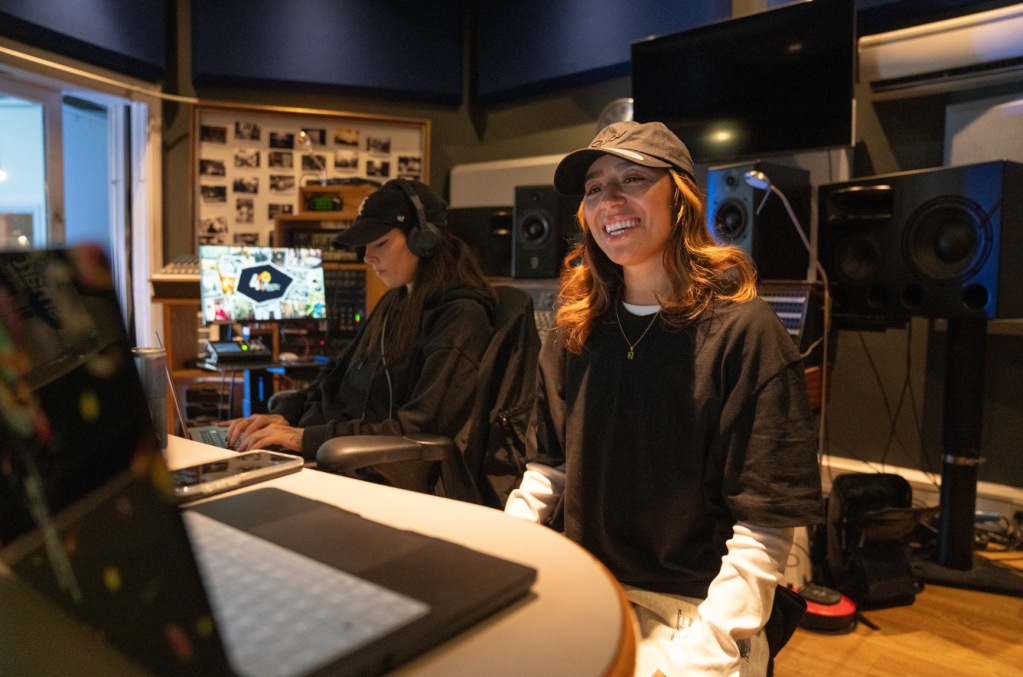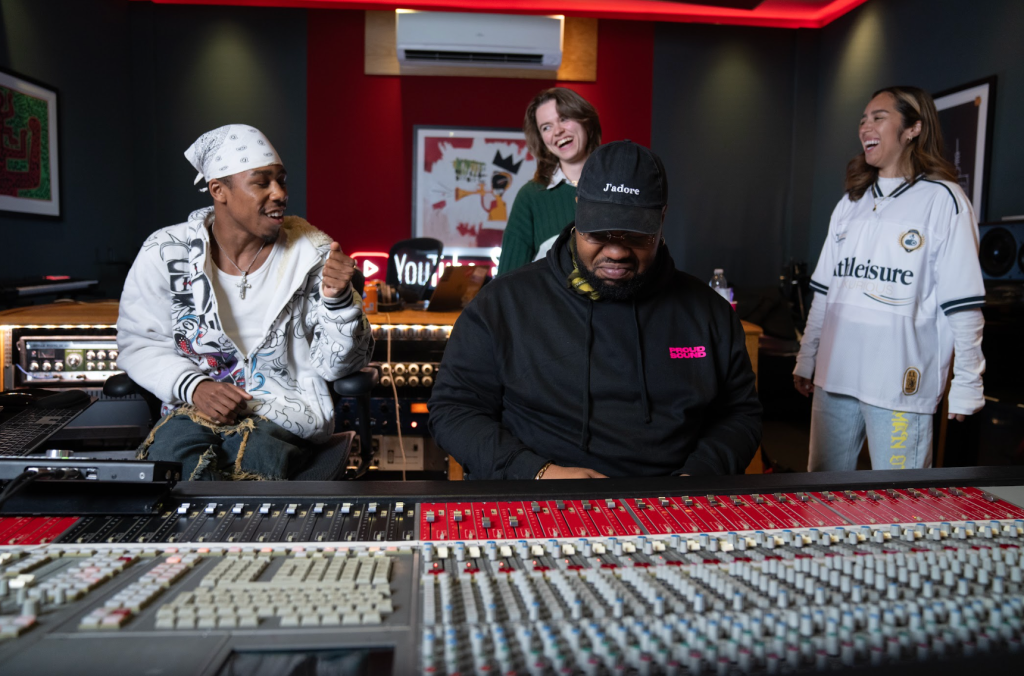How LGBTQ+ songwriters are teaming up to make pop gayer than ever: ‘Pop always has been queer’

Pop music is getting gayer – and PROUD SOUND is helping (Paradise Agency)
The face of pop music has never as queer as it is right now.
Earlier this month, Billie Eilish narrowly missed out on a UK number one with “Lunch”, her new song about sapphic oral sex. Chappell Roan, whose single “Good Luck, Babe!” laments a woman refusing to come to terms with her queer feelings, is a viral sensation. At the Grammys in February, boygenius, Victoria Monét, Miley Cyrus and Eilish – all LGBTQ+ – won big.
Seeing queer artists dominate the mainstream feels like a new or at least surging trend, but the reality is different: behind the scenes, queer writers have been creating your favourite songs for decades. Justin Tranter, who worked with Roan on “Good Luck, Babe!”, has written hits for Britney Spears, Ariana Grande, Kelly Clarkson. Bonnie McKee has worked with Katy Perry, Cher, Christina Aguilera. Trans icon TS Madison was recently honoured by the Grammys for her work on Beyoncé’s Renaissance. For as long as pop has been here, it’s always been queer.
Then, in the UK, there’s MNEK. The Brit and Grammy-nominated musician is the pen and producer behind the songs that have soundtracked your summers since 2011: Madonna’s “Living For Love”, Little Mix’s “Touch” and Dua Lipa’s “IDGAF” have all come from his mind.
In 2019, the artist, now 29, decided to impart his knowledge on fellow queer artists. He created what has since become PROUD SOUND, a days-long writing camp in partnership with Warner Chappell Music and YouTube Songwriters that empowers up-and-coming queer artists to put pen to paper, and bang out bangers.
Tucked away in an office-cum-studio in Bermondsey, decked out in Pride flags, it’s mid-June, Pride month, and the next generation of hitmakers are, well, making hits.

“I wanted to be a singer, I wanted to be a songwriter, producer – but I also wanted to have my own type of activism… but blend it in with what my passion is, which is music,” MNEK says of why he set up PROUD SOUND. “I do believe there should be more spaces for queer songwriters and producers to feel comfortable to display their art and to say their peace.”
How it works is simple: budding queer artists are writing in studio booths, with more experienced artists and songwriters, MNEK included, mentoring them to “elevate” the music they’re making. It’s a sight to behold: where else could you find Drag Race France contestant Piche, Young Royals star Omar Rudberg, and Eurovision 2024 winner Nemo making music alongside one another?
The results are either kept by the artists themselves, or pitched to major label artists – further increasing LGBTQ+ representation in the cogs of the music industry.
And every time Pride rolls around, you can guarantee the question of LGBTQ+ representation in the music industry is brought up. Each year, lesbian “Girls Like Sex” singer L Devine is asked what’s needed of the industry for it to become more welcoming for queer artists.
“This is a perfect example,” she says of PROUD SOUND, which she’s attending. “That’s what we need: more opportunity to show people that we’ve got some f**king good s**t.”

That good s**t often comes out best when working with fellow queer songwriters, adds camp attendee and “Anywhere” singer Louis III. “It’s such a special thing,” he says, “because it’s the first time you’re in a room and you share all of these experiences, and your references – someone just gets them straight away, and then the song just comes out of that.”
Those experiences and references contain multitudes. Of course, some of the greatest self-empowerment anthems of all time, from George Michael’s “Freedom! ‘90” to SOPHIE’s “Immaterial”, were created by queer artists. Similarly, the fiercest dance anthems of the 2020s have inexplicably been created by queer stars. “We know how to f**king party and have a good time,” L Devine laughs.
On the flip side, LGBTQ+ artists are in tune with specific feelings of queer shame, loss and unrequited desire that their straight counterparts simply can’t understand. “All my favourite lesbian artists know how to write songs about yearning for someone who doesn’t feel the same way as you,” Devine adds.
MNEK’s intention for PROUD SOUND is to create a sanctuary for musicians to discuss those topics with others who have likely mirrored their experiences. Yet, “if you really want to do c*nty mama boots the haus down [songs], there’s a safe space to do that,” too, they promise.
For Louis III, LGBTQ+ artists are experts at making pop music – whether it’s about slaying or sobbing – because they know what it means to view the world through a unique and subverted lens.
“Pop music is queerness, and it always has been queerness,” he explains, “because pop is finding an idea, looking at it, and turning it on its side slightly.”
He provides examples: queer people find and embrace love in unique spaces and ways. The community’s culture and nightlife is more “underground”, and its relationships are more “hidden”.
“You get this perspective that makes your pop music more interesting because you can fit the melody in a weirder way, or you fit the lyrics in a weirder way, because that’s what you experienced when you grew up,” Louis continues.
Though much pop music is written from that queer perspective, it is increasingly encroaching on the mainstream. “A few years ago, it would feel like a lot of people that listened to queer artists were queer, but now they’re transcending that audience,” says “Green Grass” singer Ellie Dixon. “Now people just listen to the music because it’s f**king good.”
Plus, queer artists are reaching broader audiences at the same time that they are becoming less inhibited, and more explicit, than ever. It’s euphoric that not only do we live in an age where a woman can sing about what another woman tastes like, but that song can rack up 250,000,00 listens on Spotify in less than four weeks.
“The effect that that would have had on me growing up as a young person in the closet, if I heard ‘Lunch’ by Billie Eilish playing in an H&M when I was shopping when I was 13,” Dixon says, astounded. “The difference that that would have made…”
It’s an important point; as lesbian anthems hit the radio waves, they’re reaching the ears of those who really need to hear them. Queerness infiltrating the music industry doesn’t just help the artists, it can change the lives of listeners, too.
Yet, there is still work to be done. Despite being over-represented in the creative world, trans and non-binary songwriters and artists are still underrepresented in terms of material success in music. In fact, more than half of the industry’s LGBTQ+ community feel underrepresented, and two-thirds have experienced microaggressions from other industry professionals.
With PROUND SOUND, MNEK is doing his part to change that, giving tomorrow’s queer hitmakers the best opportunity at getting their foot in the door.
“I can only bank on what my contribution to it all is,” he says.
“Who knows what the grand scheme of the future of queer songwriters is, because it’s such a broad thing. But I love seeing people like myself out there, doing their thing, and us all winning together.”
MUZO BY UZO & Warner Chappell Music present PROUD SOUND with YouTube Songwriters.

